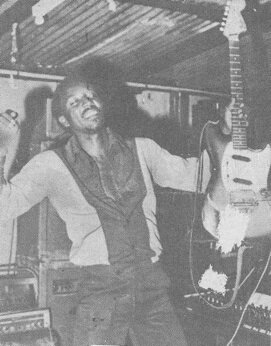Standard: Phonogram chart advertisements
In 1979-80, a two-column Phonogram advertisement ran regularly in the Standard, some weeks listing local releases that the company was plugging.
Standard: January 4, 1980: 1979 - the year of Kiswahili music
Nick Ayub’s year-end review sees signs of a Kiswahili resurgence on the back of Sina Makosa and Paulina’s success, wonders whether disco will sweep all before it and welcomes the arrival of CBS in Kenya.
Standard: February 1, 1980: Musicians’ interests should come first
The battles between producers and manufacturers over record prices and between musicians and producers over performing rights.
Standard: February 22, 1980: Senior musician on the scene
Profile of John Nzenze, who had a series of Twist hits in the 1960s and was a founder member of Air Fiesta. Also a small sidebar on Tanzanian band Sunburst.
Standard: March 14, 1980: Kayembe Beauchad
Short profile of the Congolese musician and member of Super Bwambe.
Standard: May 16, 1980: Super Mazembe are aiming high
Longwa Didos reveals the secrets of the band’s success.
Standard: June 6, 1980: The Blue Stars have arrived
As the band behind the great Sina Kisomo prepare to our Zambia and Malawi, they discuss their origins.
In Nairobi to sign a new contract with Polygram, Verckys Kiamwangwana Mateta discusses why musicians are leaving Kinshasa and warns that nightclub owners are stifling Kenyan bands’ creativity. Also, tours announced by Franco’s TPOK Jazz and Nguza Viking’s Orch Maquis du Zaire. Intriguingly, TPOK Jazz is described as a 55-man outfit and Orch Maquis as a 36-man operation.
Jumamosi, November 17, 1984: Mangelepa yarudi jukwaani
Article in Kiswahili on why Orch Les Mangelepa are back in the limelight, plus adverts for gigs that weekend. Apologies for the poor scan quality.
Jumamosi, January 12, 1985: Asia wa Double O
Profile in Kiswahili of Asia Said Darwesh, keyboards player with King Kiki’s Orchestra Double O, plus gig adverts.
Uhuru, March 6, 1985: Small ads for gigs
Dar es Salaam music fans faced difficult choices. Should they go out dancing to King Kiki or to Orch Safari Sound tonight?
Daily Nation: September 28, 1985: Zaiken get down to it, plus Issy isn’t singing
Abdullah Madjo Maduley’s Zaiken International find a Nairobi residency. Recently released from prison for violating Kenya’s immigration laws, Issy Juma denies he is singing illegally in the country. Also, Maroon Commandos and Jospeh Kamaru play a benefit gig and Kenya’s disco dancing champion crowned.
Sunday Standard: September 29, 1985: Milka’s new song is a winner
A chart round-up singles out Milka Muthoni’s Mirimu Ya Mehia as well as DO Misiani, John Ndichu, TPOK Jazz and Lokassa Ya Mbongo as selling well. Also, Nairobi’s Conservatoire of Music plns to open a studio and assemble a library of local and global music.
Like Orchestras Makassy and Mazembe, Fela Kuti and Sunny Ade have failed to capture the imagination of American and European record-buyers. The use of low-quality cassettes even on offical releases has made consumers wary of buying them.
Mombasa Roots live in the capital entertain the crowds but rely on covers rather than original music. Remmy Ongala complains that his music is being pirated abroad because Radio Tanzania does not do enough to protect its recordings. Also success for Dick Mutuku Mulwa’s Ngoleni Brothers Band.
On his retirement Isayo Mwinamo, A&R manager at Phonogram, advises Kenyan musicians to emulate the work ethic of the late Mbaraka Mwinshehe, plus Batamba Moreno records with Margaret Safari and Sheila Tett of Kenya Blue Stars and Simon Kihara of Mbiri Stars says he owes his current success to the church.

Source material
This section of the website consists of articles about music and musicians that appeared in contemporary East African newspapers. It’s a highly selective selection. The Kenyan press gave surprisingly little coverage to the local music scene in 1979-1980, the years I have looked at so far.
In 1979-80, The Standard, one of Kenya’s two main newspapers, ran a page every Friday in its Weekend section called The World of Music. Much of the space was given over to international acts, either on tour or on record. You were more likely to find articles about British record producer Norrie Paramor than about Orchestra Shika Shika.
Pages from the Nation in Kenya and Jumamosi and Uhuru in Tanzania have been provided by Flemming Harrev and Standard ones by myself from copies of Kenyan newspapers held on microfilm at the British Library’s Newspaper Library in North London. Flemming has also kindly provided a selection of pages from the Standard, Sunday Standard and Daily Nation from autumn 1985, which show more coverage of the regions than in earlier years.

The quality of printing is not great on the Kenyan articles I have uploaded because of the way the images have been generated: original newspaper to microfilm to photocopy to scan to JPEG. To try and ensure legibility I have made the articles appear as large as I can on page but in places reading them is still a bit of a struggle.
Dr Mabera, guitarist with Juwata Jazz Band, from an advert in the Tanzanian newspaper Jumamosi, January 12, 1985